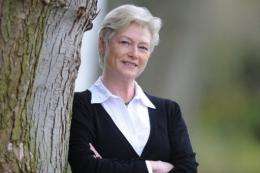The new chief of the International Energy Agency Maria van der Hoeven, pictured in March 2011, said Wednesday nuclear power will have a place in the future despite the Fukushima catastrophe and the decision by some countries to opt out.
The new chief of the International Energy Agency Maria van der Hoeven said Wednesday nuclear power will have a place in the future despite the Fukushima catastrophe and the decision by some countries to opt out.
Van der Hoeven, formerly the Dutch minister for economic affairs, said she would be looking to countries to explain how they plan to cover their energy needs.
"If you would like to abandon nuclear, then my question is: 'How are you going to meet the growing demand of energy when you are abandoning one of your sources?", she said in an interview with AFP.
"That question has to be answered by all those countries and governments who would like to abandon nuclear."
She added: "If the answer is 'we'll do it with renewables', then my question will be 'how'?.
"How cost effective are renewables? How much are they deployed at this moment? How are you going to speed up the curve of renewables so that they're going to be a greater part of the energy supply?"
Van der Hoeven took up the post of IEA executive director on September 1, succeeding Japan's Nobuo Tanaka.
The country is still coming to terms with the massive March 11 earthquake and tsunami which knocked out cooling systems at the Fukushima Daiichi plant, causing reactors to overheat and radiation to leak.
Germany switched off several of its reactors in the wake of the disaster and has since passed legislation to phase out nuclear energy by 2022.
A recent vote against Italian premier Silvio Berlusconi's plans to resume the country's nuclear programme was also seen as a reflection of popular unease about atomic energy in Europe after Fukushima.
The Swiss government in May, too, recommended that nuclear plants be phased out.
Van der Hoeven said: "There will be room for nuclear energy in the future.
"I think if we really want to go -- and we do -- towards a future where we have less CO2 emissions, there are only two real things to get there, and it has to do with nuclear because it doesn't produce CO2 and it has to do with renewables.
"And in the meantime there is gas. So these are the three things we are talking about."
The Paris-based IEA is the energy branch of the Organisation for Economic Co-operation and Development.
(c) 2011 AFP
























